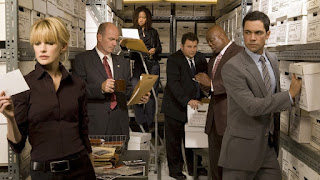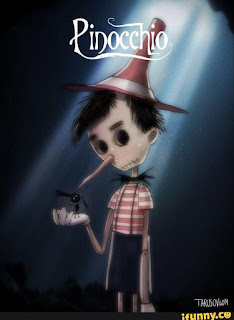Genre: Horror
Directed: Jeremy Saulnier
Stars: Anton Yelchin, Imogen Poots, Alia Shawkat, Patrick Stewart, Macon Blair, Joe Cole, Callum Turner, David W. Thompson, Mark Webber, Brent Werzner
Production: Broad Green Pictures
Good Lord, what have we unleashed? For the last few years director Jeremy Saulnier has been haunting the independent movie scene with his idiosyncratic aesthetic. His coup the triumph; Blue Ruin (2013) became a festival darling garnering slow and steady support via home video and late-night HBO reruns. I had the pleasure of seeing Blue Ruin and thinking its subversive tension was the kick in the pants modern cinema needed. But Green Room...well Green Room is an entirely different beast.
The story begins rather pensively. Four band mates of a proudly lo-fi punk band take a gig at a rural ramshackle club somewhere in the Pacific Northwest. They're warned the patrons of the club are Nazi far-right (though really ultra-left) types but the foursome aren't exactly in any position to be picky. The show goes off without a hitch but before they can leave Pat (Yelchin) witnesses a grisly murder thus sealing the band's fate as the next victims of Darcy (Stewart) and his cult of skinheads. Caught in her own story is Amber (Poots) who was friends with the deceased.
What sets Green Room apart from other slasher films is it's economy of narrative. Not a single frame is wasted on unnecessary background, boring exposition dumps or contrived wrap-ups and explanations. Everything that can and should be known about the characters, and the story itself is implied visually. One could put the film on mute and still feel intimately involved with the band and grimly bracing for impending doom.
Green Room wisely trades in Blue Ruin's callous and quirky tension for a corrosive sense of dread that soaks through the story like an open wound. This dread is personified by Patrick Stewart who does a fabulous job playing against type as the club's true-believer owner. Unlike the majority of his underlings, who respond to the adrenaline poisoning their veins, Stewart's Darcy is always collected. It's as if he's done this kind of thing before and has no compunction making a group of washout twenty-somethings disappear. Even if that means losing a couple of hungry pitbulls in the process.
Green Room takes all the familiar elements of a slasher horror film and quietly tinkers with them, bringing it's audience a lean and mean little movie. It'd be hard to pigeonhole this film as a simple and effective horror film or a solid suspense film. It's both and neither. When the story comes to a crossroads, it always veers towards tactile suspense over outright gore (though to be clear gore is clear and abundantly present). Green Room brings to mind the best elements of Assault on Precinct 13 (1976) mixed with the dread of Halloween (1978) and visual leitmotifs that would have made Kieslowski smile.
Like Pandora's box, Prometheus's fire or playing Jumanji (1995) for the first time, the world has been properly introduced to the likes of director Jeremy Saulnier. He's a man of great skill and an obvious fixation with the macabre, though always for the sake of a good story. Here's to hoping Saulnier has a bright future which I have a hunch may include a newly minted Three Colors Trilogy (1993-1994) for the modern age.
 |
| Like this only more violent and less French |
















































